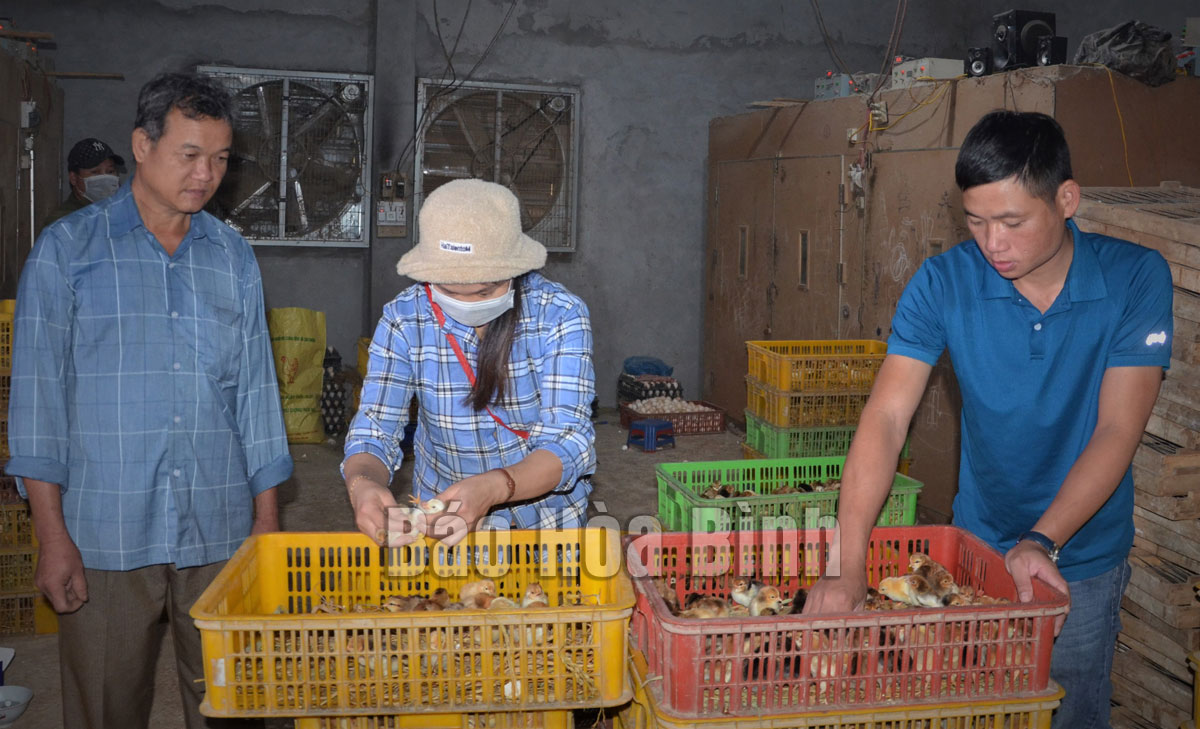
(HBO) – A disadvantaged household but thanks to an access to loans, Bui Van Hue's family in Dang 2 hamlet, Quyet Thang commune, Lac Son district started a model of hatching and breeding local chickens that brings about hundreds of millions of VND each year. In 2017, Hue encouraged several other households to form a livestock cooperative and supply chickens. Up to now, the cooperative has 10 members specialised in supplying commercial and breeding chickens to the market, contributing to increasing income and creating jobs for many local workers.

On average, Bui Van Hue's family and Chi Thien chicken breeding and supply cooperative in Lac Son district export over 30,000 local breeding chickens per month.
Hue said in 2012, he noticed that Lac Son's indigenous chicken breed, with small claws, firm and delicious meat, was highly favoured by the market. Starting from the need to maintain the purebred and to supply the market, his family invested in a hatchery to supply indigenous breeding chickens.
The biggest challenge is selecting the best brooding breeds. Lac Son district has cooperated with departments and agencies to carry out a research on preserving the gene pool of Lac Son's indigenous breeding chickens, he said.
By now, after many years of continuous trials and failures, Hue's family has perfected a closed-loop process of supplying Lac Son indigenous breeding chickens to the market. His family raises from 5,000-6,000 chickens per year, providing input materials for four hatcheries. On average, his family ships over 30,000 chickens per month, mainly to the local market and provinces such as Son La, Nghe An, and Thanh Hoa. From supplying breeding chickens and selling meat, his family earns an annual revenue of around 13 billion VND (565,000 USD) and a profit of nearly 2 billion VND.
Apart from directly selling to merchants, the cooperative sets up a distribution centre in Hanoi that specialises in providing live and ready-to-eat chickens at an average price of 130,000 VND/kg or higher. Since joining the cooperative, each household has planned a concentrated breeding area of about 1-2 ha, raising an average of 1,000-2,000 chickens per batch. Considering market demand, the cooperative expects to expand the scale of breeding and adopt VietGAP standards, ensure food safety and hygiene, and develop into a value chain for its products./.
Dao Village’s honey – a product certified with a 3-star OCOP (One Commune One Product) rating by Thong Nhat Agricultural Cooperative in Dao Village (Hoa Binh City) – is highly regarded by consumers for its quality, richness, and variety in packaging. The distinctively sweet taste of Dao Village’s honey leaves a lasting impression on anyone who has tried it.
In alignment with Project No. 07-DA/TU, issued by the Hoa Binh provincial Party Committee on November 1, 2021, Lac Thuy district has actively promoted investment and supported the sustainable development of its industrial and handicraft sectors during the 2021–2025 period. Alongside this, the district has remained committed to preserving and revitalising traditional craft villages.
Located in the northern part of Lac Thuy district, with a temperate climate and fertile soil, Phu Thanh commune has great potential and advantages in growing tea. The long-standing experience, combined with strict adherence to organic farming practices in the tea gardens, ensures that the dried tea products from Phu Thanh and Lac Thuy as a whole are sold out immediately upon production, providing a stable and prosperous life for the local people.
Amid efforts to streamline the administrative apparatus, Hoa Binh province has intensified measures to address challenges in land clearance, resettlement support, and infrastructure investment, aiming to speed up the progress of key projects.
Hoa Binh province has posted an unprecedented economic growth rate of 12.76% in the first quarter of 2025, marking its highest quarterly performance to date and positioning it as the second fastest-growing locality in the country, trailing only Bac Giang province.
Under current regulations, products in the One Commune – One Product (OCOP) programme that are rated three stars or higher must undergo re-evaluation every three months. However, in reality, some of these products fail to consistently meet the required standards, raising concerns about the sustainability of their OCOP certification. This underscores the urgent need for producers to enhance product quality and gradually develop their OCOP products into strong, marketable brands.



